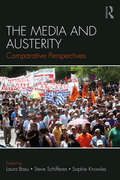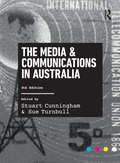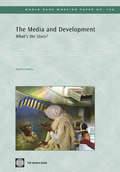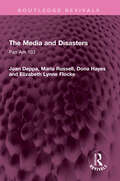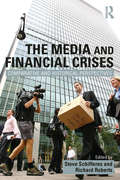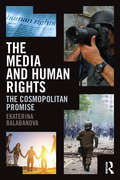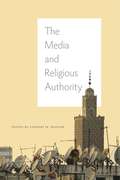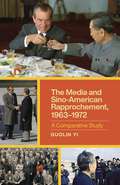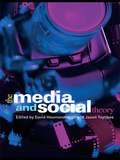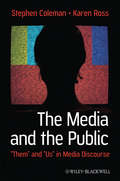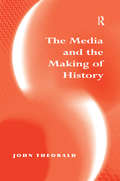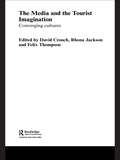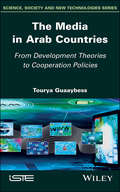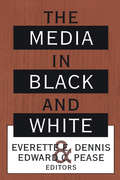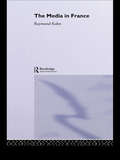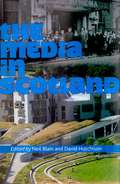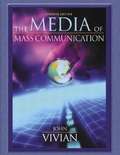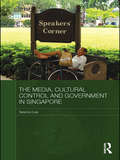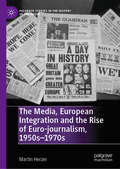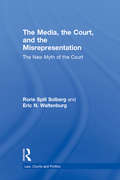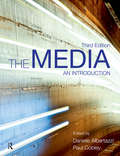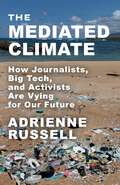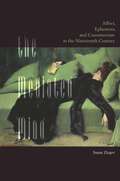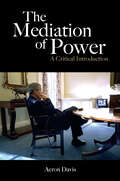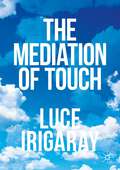- Table View
- List View
The Media and Austerity: Comparative perspectives
by Laura Basu Steve Schifferes Sophie KnowlesThe Media and Austerity examines the role of the news media in communicating and critiquing economic and social austerity measures in Europe since 2010. From an array of comparative, historical and interdisciplinary vantage points, this edited collection seeks to understand how and why austerity came to be perceived as the only legitimate policy response to the financial crisis for nearly a decade after it began. Drawing on an international range of contributors with backgrounds in journalism, politics, history and economics, the book presents chapters exploring differing media representations of austerity from UK, US and European perspectives. It also investigates practices in financial journalism and highlights the role of social media in reporting public responses to government austerity measures. They reveal that, without a credible and coherent alternative to austerity from the political opposition, what had been an initial response to the consequences of the financial crisis, became entrenched between 2010 and 2015 in political discourse. The Media and Austerity is a clear and concise introduction for students of journalism, media, politics and finance to the connections between the media, politics and society in relation to the public perception of austerity after the 2008 global financial crash.
The Media and Communications in Australia
by Stuart Cunningham Sue TurnbullTraditional media are being reshaped by digital technologies. The funding model for quality journalism has been undermined by the drift of advertising online, demarcations between different forms of media are rapidly fading, and audiences have fragmented. We can catch up with our favourite TV show on a tablet, social media can be more important than mainstream radio in a crisis, and organisations large and small have become publishers in their own right on apps. Nevertheless mainstream media remain powerful.The Media and Communications in Australia offers a systematic introduction to this dynamic field. Fully updated and revised to take account of recent developments, this fourth edition outlines the key media industries and explains how communications technologies are impacting on them. It provides a thorough overview of the main approaches taken in studying the media, and includes an expanded 'issues' section with new chapters on social media, gaming, apps, the environment, media regulation, ethics and privacy.With contributions from some of Australia's best researchers and teachers in the field, The Media and Communications in Australia remains the most comprehensive and reliable introduction to media and communications available. It is an ideal student text, and a reference for teachers of media and anyone interested in this influential industry.
The Media and Development: What's the Story?
by Gareth LocksleyThe media's contribution to development occurs simultaneously along five closely intermingled influences: plurality and transparency, behavioral, infrastructure and platform, economic, and trade. The media are at the cutting edge of technological change, where the digitalization of content, Next Generation Networks, falling device and distribution costs, ever-increasing abundance and new business models are overturning the pre-existing order of markets and the media, though broadcasting, particularly radio, remain crucial in developing countries. This offers new development opportunities requiring new policy initiatives, and the realization of this by the development community. In many instances the media has yet to attain its appropriate status on the list of development priorities.
The Media and Disasters: Pan Am 103 (Routledge Revivals)
by Joan Deppa Maria Russell Dona Hayes Elizabeth Lynne FlockeFirst published in 1993, The Media and Disasters looks behind the key scenes in the drama unfolding in the aftermath of the Pan Am 103 explosion: Lockerbie, visited by an estimated 1000 journalists in the month following the disaster; New York’s Kennedy Airport, where families learned in the presence of the media that their loved ones had perished; Syracuse University, plunged into mourning the loss of 35 students from the school’s study abroad programme; and homes on both sides of the Atlantic, grief-stricken as news reached relatives of the passengers and crew. The authors, professors of communication at Syracuse University with years of media experience, began looking at the effects of such coverage because of what they experienced when the media came to cover the grieving on their campus. What they learned in the U.S. and the U.K. will interest those concerned about media coverage of crisis events, as well as those who communicate about them: journalists, survivors, public information officers, public relations practitioners, emergency support personnel, business and political leaders.
The Media and Financial Crises: Comparative and Historical Perspectives
by Richard Roberts Steve SchifferesThe Media and Financial Crises provides unique insights into the debate on the role of the media in the global financial crisis. Coverage is inter-disciplinary, with contributions from media studies, political economy and journalists themselves. It features a wide range of countries, including the USA, UK, Ireland, Greece, Spain and Australia, and a completely new history of financial crises in the British press over 150 years. Editors Steve Schifferes and Richard Roberts have assembled an expert set of contributors, including Joseph E Stiglitz and Lionel Barber, editor of the Financial Times. The role of the media has been central in shaping our response to the financial crisis. Examining its performance in comparative and historical perspectives is crucial to ensuring that the media does a better job next time. The book has five distinct parts: The Banking Crisis and the Media The Euro-Crisis and the Media Challenges for the Media The Lessons of History Media Messengers Under Interrogation The Media and Financial Crises offers broad and coherent coverage, making it ideal for both students and scholars of financial journalism, journalism studies, media studies, and media and economic history.
The Media and Human Rights: The Cosmopolitan Promise
by Ekaterina BalabanovaIn recent years there has been an explosion in the usage and visibility of the language of human rights, but what does this mean for the role of the media? For evolving ideas about human rights? And for the prospect of shared cosmopolitan values? Ekaterina Balabanova argues that in order to answer these questions there needs to be a deconstruction of monolithic ways of thinking about the media and human rights, incorporating the spectrum of political arguments and worldviews that underpin both. Ten case studies are presented which illustrate many of the problems and challenges associated with the relationship between the media and human rights. The examples range from cases of humanitarian intervention to analysis of global human rights campaigning on refugee issues; from immigration and asylum, to genocide, freedom of speech and torture. Anchored in an appreciation of the political conflicts and compromises at the heart of international human rights agreements, The Media and Human Rights is an invaluable resource for students studying media and human rights, international politics, security studies and political communication.
The Media and Religious Authority
by Stewart M. HooverAs the availability and use of media platforms continue to expand, the cultural visibility of religion is on the rise, leading to questions about religious authority: Where does it come from? How is it established? What might be changing it? The contributors to The Media and Religious Authority examine the ways in which new centers of power and influence are emerging as religions seek to “brand” themselves in the media age. Putting their in-depth, incisive studies of particular instances of media production and reception in Asia, Africa, Latin America, and North America into conversation with one another, the volume explores how evolving mediations of religion in various places affect the prospects, aspirations, and durability of religious authority across the globe.An insightful combination of theoretical groundwork and individual case studies, The Media and Religious Authority invites us to rethink the relationships among the media, religion, and culture.The contributors are Karina Kosicki Bellotti, Alexandra Boutros, Pauline Hope Cheong, Peter Horsfield, Christine Hoff Kraemer, Joonseong Lee, Alf Linderman, Bahíyyah Maroon, Montré Aza Missouri, and Emily Zeamer, with an afterword by Lynn Schofield Clark.
The Media and Sino-American Rapprochement, 1963–1972: A Comparative Study
by Guolin YiAn important new cultural study of the Cold War, Guolin Yi’s The Media and Sino-American Rapprochement, 1963–1972 analyzes how the media in both countries shaped public perceptions of the changing relations between China and the United States in the decade prior to Richard Nixon’s visit to Beijing. This book offers the first systematic study of Cankao Xiaoxi (Reference News), an internal Chinese newspaper that carried relatively objective stories the Xinhua News Agency translated from world news media for circulation among Communist cadres. As the main channel for the cadres to learn about the outside world, this newspaper provides a window into China’s evolving foreign policy, including the reception of signals from the Nixon administration. Yi compares this internal communications channel with the public accounts contained in the more widely circulated newspaper People’s Daily, a chief propaganda outlet of the Chinese Communist Party (CCP) directed at its own people and China watchers all over the world. A third level of communication emerges in classified CCP instructions and government documents. By approaching the Chinese communication system on three levels—internal, public, and classified—Yi’s analysis demonstrates how people at different positions in the political hierarchy accessed varying types of information, allowing him to chart the development of Beijing’s approach to the U.S. government. In a corresponding analysis of the defining features of American reporting on China, Yi considers the impact of government-media relationships in the United States during the Cold War. Alongside prominent magazines and newspapers, particularly the New York Times and the Washington Post in their differing coverage of key events, Yi discusses television networks, which proved vital for promoting the success of Ping-Pong Diplomacy and the impact of Nixon’s visit in 1972. With its comparative study of news outlets in the two countries, The Media and Sino-American Rapprochement, 1963–1972 presents a thorough and comprehensive perspective on the role of the media in influencing domestic Chinese and American public opinion during a critical decade.
The Media and Social Theory (CRESC)
by David Hesmondhalgh Jason ToynbeeMedia studies needs richer and livelier intellectual resources. This book brings together major and emerging international media analysts to consider key processes of media change, using a number of critical perspectives. Case studies range from reality television to professional journalism, from blogging to control of copyright, from social networking sites to indigenous media, in Europe, North America, Asia and elsewhere. Among the theoretical approaches and issues addressed are: critical realism post-structuralist approaches to media and culture Pierre Bourdieu and field theory public sphere theory – including post-Habermasian versions actor network theory Marxist and post-Marxist theories, including contemporary critical theory theories of democracy, antagonism and difference. This volume is essential reading for undergraduate and postgraduate students and researchers of cultural studies, media studies and social theory.
The Media and The Public: "Them" and "Us" in Media Discourse (Communication in the Public Interest #10)
by Karen Ross Stephen ColemanThe Media and the Public explores the ways a range of media, from the press to television to the Internet, have constructed and represented the public. Provides a new synthesis of recent research exploring the relationship between media and their publics Identifies ways in which different publics are subverting the gatekeeping of mainstream media in order to find a voice and communicate with others Situates contemporary media-public discourse and relationships in an historical context in order to show the origin of contemporary public/political engagement Creates a theoretical expansion on the role of the media in accessing or denying the articulation of public voices, and the ways in which publics are harnessing new media formats to produce richer and more complex forms of political engagement
The Media and the Making of History
by John TheobaldWhile the huge impact of the mass media on everyday social life is acknowledged, it has generally been assigned a peripheral role in the historical process. This intriguing book demonstrates that, far from being a footnote, media discourse has been a critical factor in recent European history, and indeed one that distinguishes the twentieth century from all previous ones. John Theobald looks back to the First World War, analyzing the use and abuse of journalistic discourse in the portrayal of events to the public and to decision-makers. He goes on to present a series of case studies demonstrating the active mass media role in a selection of key events from the twentieth century including: the Cold War, the collapse of Communism in the GDR and German unification, debates over the European Union and the impact of September 11, 2001. He sets these studies within the context of traditions of radical mass media criticism from early analysts such as Kraus, Tönnies and Tarde through to contemporaries such as Chomsky, Bourdieu and Pilger.
The Media and the Tourist Imagination: Converging Cultures (Contemporary Geographies of Leisure, Tourism and Mobility)
by David Crouch Rhona Jackson Felix ThompsonTourism studies and media studies both address key issues about how we perceive the world. They raise acute questions about how we relate local knowledge and immediate experience to wider global processes, and they both play a major role in creating our map of national and international cultures. Adopting a multidisciplinary approach, this book explores the interactions between tourism and media practices within a contemporary culture in which the consumption of images has become increasingly significant. A number of common themes and concerns arise, and the contributions included are divided between those: written from media studies awareness perspective, concerned with the way the media imagines travel and tourism written from the point of view of the study of tourism, considering how tourism practices are affected or altered by the media that attempt a direct comparison between the practices of tourism and the media. Incorporating case study material from the UK, the Caribbean, Australia, the US, France and Switzerland, this significant text - ideal for students of culture, media and tourism studies - discusses tourism and the media as separate processes through which identity is constructed in relation to space and place.
The Media in Arab Countries: From Development Theories to Cooperation Policies
by Tourya GuaaybessIn early research work on international communication, the countries of North Africa and the Middle East were seen as part of the “Third World”, and the media had to be at the service of development. However, this situation is changing due to the transnationalization and liberalization of the media. Indeed, since the 1990s, the entry of the South – and Arab countries in this case – into the “information society” has become the dominant creed, although the vision is still globalizing and marked by stereotypes. Representations of these societies are closely associated with international relations and geopolitics, characterized by tensions and conflicts. However, a force has come to disrupt the traditional rules of the game: Arab audiences. Digital media, the dissemination of which has been enabled by the implementation of the “information society”, empowers them to participate fully in a media confluence. This liberation from the discourse has two major consequences: the media and journalism sector has become more strategic than ever, and action toward development must be reinvented.
The Media in Black and White
by Everette E. DennisThe media's treatment of and interaction with race, like race itself, is one of the most sensitive areas hi American society. Whether hi its coverage and treatment of racial matters or racial connections inside media organizations themselves, mass communication is deeply involved with race. The Media in Black and White brings together twenty journalists and scholars, of various racial backgrounds, to grapple with a controversial issue: the role that media industries, from advertising to newspapers to the information superhighway, play in helping Americans understand race.Contributors include Ellis Cose, a contributing editor for Newsweek; Manning Marable, chairman of Columbia University's African-American Research Center; William Wong, a columnist for the Oakland Tribune; Lisa Penaloza, a University of Illinois professor; and Melita Marie Garza, a Chicago Tribune reporter. Among the topics discussed are: the quality of reporting on immigrant issues; how sensationalism may be deepening the chasm of misunderstanding between the races; how the coverage of America's drug wars has been marked by racism; and whether politically correct language is interfering with coverage of vital issues and problems.The contributors of The Media in Black and White hope to broaden the narrow vision of the United States and the world beyond with their contributions to the debate over race and the media. The commentary found hi this important work will be of interest to sociologists, communication specialists, and black studies scholars.
The Media in France (Routledge In Asia Ser.)
by Raymond KuhnThis up-to-date, accessible textbook presents a comprehensive overview of the history, present and future prospects of French media, and considers the successes and failures of the French media policy from 1945 to the present day.Raymond Kuhn investigates the politics and economics of the press, radio and television, from the days of state intervention and monopoly provision to current trends towards deregulation and pluralism, and discusses the importance of the `new media' of cable and satellite broadcasting. Kuhn explores in particular the changing inter-relationship between media and state, as ownership and indirect interference decline while the state remains a key part of the media landscape in its policy making and regulatory roles.The Media in France is essential reading for all students of French, European and Media Studies.
The Media of Mass Communication
by John VivianThe text surveys topics including the overall pervasiveness of the mass media, books, magazines, newspapers, records, movies, radio, television, the Web, journalism, public relations, advertising, and issues such as ethics, law, and media's impact on society.
The Media, Cultural Control and Government in Singapore (Media, Culture and Social Change in Asia)
by Terence LeeThis book explores this inherent contradiction present in most facets of Singaporean media, cultural and political discourses, and identifies the key regulatory strategies and technologies that the ruling People Action Party (PAP) employs to regulate Singapore media and culture, and thus govern the thoughts and conduct of Singaporeans. It establishes the conceptual links between government and the practice of cultural policy, arguing that contemporary cultural policy in Singapore has been designed to shape citizens into accepting and participating in the rationales of government. Outlining the historical development of cultural policy, including the recent expansion of cultural regulatory and administrative practices into the ‘creative industries’, Terence Lee analyzes the attempts by the Singaporean authorities to engage with civil society, the ways in which the media is used to market the PAP’s policies and leadership and the implications of the internet for the practice of governmental control. Overall, The Media, Cultural Control and Government in Singapore offers an original approach towards the rethinking of the relationship between media, culture and politics in Singapore, demonstrating that the many contradictory discourses around Singapore only make sense once the politics and government of the media and culture are understood.
The Media, European Integration and the Rise of Euro-journalism, 1950s–1970s (Palgrave Studies in the History of the Media)
by Martin HerzerThis book explains how the media helped to invent the European Union as the supranational polity that we know today. Against normative EU scholarship, it tells the story of the rise of the Euro-journalists – pro-European advocacy journalists – within the post-war Western European media. The Euro-journalists pioneered a journalism which symbolically magnified the technocratic European Community as the embodiment of Europe. Normative research on the media and European integration has focused on how the media might help to construct a democratic and legitimate European Union. In contrast, this book aims to deconstruct how journalists – as part of Western European elites – played a key role in elite European identity building campaigns.
The Media, the Court, and the Misrepresentation: The New Myth of the Court (Law, Courts and Politics)
by Rorie Spill Solberg Eric N. WaltenburgThe Court’s decisions are interpreted and disseminated via the media. During this process, the media paints an image of the Court and its business. Like any artist, the media has license regarding what to cover and the amount of attention devoted to any aspect of the Court and its business. Some cases receive tremendous attention, while others languish on the back pages or are ignored. These selection effects create a skewed picture of the Court and its work, and might affect public attitudes toward the Court. Indeed, studies of media coverage of other governmental institutions reveal that when, and how, their policy decisions are covered has implications for the public’s understanding of, compliance with, support for, and cynicism about the policy. This book uncovers and describes this coverage and compares it to the confirmation hearings, the Court’s actual work, even its members. Rorie Spill Solberg and Eric N. Waltenburg analyze media coverage of nominations and confirmation hearings, the justices’ "extra-curricular" activities and their retirements/deaths, and the Court’s opinions, and compare this coverage to analyses of confirmation transcripts and the Court’s full docket. Solberg and Waltenburg contend that media now cover the Court and its personnel more similarly to its coverage of other political institutions. Journalists still regurgitate a mythology supported by the justices, a "cult of the robe," wherein unbiased and apolitical judges mechanically base their decisions upon the law and the Constitution. Furthermore, they argue the media also focus on the "cult of personality," wherein the media emphasize certain attributes of the justices and their work to match the public’s preferences for subject matter and content. The media’s portrayal, then, may undercut the Court’s legitimacy and its reservoir of good will.
The Media: An Introduction
by Paul Cobley Daniele AlbertazziToday, arguably more than at any time in the past, media are the key players in contributing to what defines reality for the citizens of Europe and beyond. This book provides an introduction to the way that the media occupy such a position of prominence in contemporary human existence. This expanded and fully updated third edition of the bestselling The Media: An Introduction collects in one volume thirty-six specially commissioned essays to offer unrivalled breadth and depth for an introduction to the study of contemporary media. It addresses the fundamental questions about today’s media – for example, digitisation and its effects, new distribution technologies, and the implications of convergence, all set against the backdrop of a period of profound social and economic change in Europe and globally. Key features: Expert contributions on each topic Approachable, authoritative contributions provide a solid theoretical overview of the media industry and comprehensive empirical guide to the institutions that make up the media. Further Reading and related web-resource listings encourage further study. New to this edition: New five part structure provides a broad and coherent approach to media: Part 1 Understanding the Media; Part 2 What Are the Media?; Part 3 The Media Environment; Part 4 Audiences, Influences and Effects; Part 5 Media Representations. Brand new chapters on: Approaches to Media; Media Form; Models of Media Institutions; The Media in Europe; Photography; Book Publishing; Newspapers; Magazines; Radio; Television; The Internet and the Web; News Media; Economics; Policy; Public Service Broadcasting in Europe; Censorship and Freedom of Speech; Audience Research; Sexualities; Gender; Social Class; Media and Religion; The Body, Health and Illness; Nationality and Sex Acts. Other chapter topics from the last edition fully updated A wider, more comparative focus on Europe. The Media: An Introduction will be essential reading for undergraduate and postgraduate students of media studies, cultural studies, communication studies, journalism, film studies, the sociology of the media, popular culture and other related subjects.
The Mediated Climate: How Journalists, Big Tech, and Activists Are Vying for Our Future
by Adrienne RussellTo what extent does journalism deserve blame for the failure to address climate change over the last thirty years? Critics point out that climate coverage has often lacked necessary urgency and hewed to traditional notions of objectivity and balance that allowed powerful interests—mainly fossil fuel companies—to manufacture doubt. Climate journalism, however, developed alongside the digital media landscape, which is characterized by rampant misinformation, political polarization, unaccountable tech companies, unchecked corporate power, and vast inequalities. Under these circumstances, journalism struggled, and bad actors flourished, muddling messages while emissions mounted and societies struggled to avert catastrophe.The Mediated Climate explores the places where the climate and information crises meet, examining how journalism, activism, corporations, and Big Tech compete to influence the public. Adrienne Russell argues that the inadequate response to climate change is intertwined with the profound challenges facing the communications environment. She demonstrates that the information crisis is driven not only by technological changes but also by concentrated power that predates the rise of digital media companies. Efforts to improve climate coverage must take into account the larger social and material contexts in which journalism operates and the broader power dynamics that shape public discourse. Drawing on interviews with journalists and activists, Russell considers the ways recent movements are battling misinformation. She offers timely recommendations to foster engagement with climate issues and calls on readers to join in efforts to reshape the media landscape to better serve the public interest.
The Mediated Mind: Affect, Ephemera, and Consumerism in the Nineteenth Century
by Susan ZiegerHow did we arrive at our contemporary consumer media economy? Why are we now fixated on screens, imbibing information that constantly expires, and longing for more direct or authentic kinds of experience? The Mediated Mind answers these questions by revisiting a previous media revolution, the nineteenth-century explosion of mass print. Like our own smartphone screens, printed paper and imprinted objects touched the most intimate regions of nineteenth-century life. The rise of this printed ephemera, and its new information economy, generated modern consumer experiences such as voracious collecting and curating, fantasies of disembodied mental travel, and information addiction. Susan Zieger demonstrates how the nineteenth century established affective, psychological, social, and cultural habits of media consumption that we still experience, even as pixels supersede paper. Revealing the history of our own moment, The Mediated Mind challenges the commonplace assumption that our own new media lack a past, or that our own experiences are unprecedented.
The Mediation of Power: A Critical Introduction (Communication and Society)
by Aeron DavisThe Mediation of Power investigates how those in positions of power use and are influenced by media in their everyday activities. Each chapter examines this theme through an exploration of some of the key topics and debates in the field, including: theories of media and power media policy and the economics of information news production and journalistic practice public relations and media management culture and power political communication and mediated politics new and alternative media interest group communications media audiences and effects. The debates are enlivened by first-hand accounts taken from over 200 high-profile interviews with politicians, journalists, public officials, spin doctors, campaigners and captains of industry. Tim Bell, David Blunkett, Iain Duncan Smith, Simon Heffer, David Hill, Simon Hughes, Trevor Kavanagh, Neil Kinnock, Peter Riddell, Polly Toynbee, Michael White and Ann Widdecombe are some of those cited.
The Mediation of Touch
by Luce IrigarayThe first communication between human beings, the one between the newborn and the mother, happens through touch. Strangely this first way of relating to each other has barely been considered by our education and our culture, which have favoured sight to the detriment of touch. And yet touching and being touched means experiencing ourselves as living beings. For lack of such a touch, we do not perceive the limits nor the sensitive potential of our bodies. Then we remain immersed in a natural or a cultural universe, incapable of reaching our own individuation and of knowing our fundamental difference from the other(s).Desire, in particular sexuate desire, is a call for touching one another anew. But this touch requires us to have gained our autonomy and to be able to open up to and commune with the other as transcendent to ourselves while staying in ourselves. This book unveils and explores how touch can act as a basic living mediation in love and,more generally, in our comprehensive individual and collective human becoming. It also considers how touch can contribute to founding a culture respectful of difference instead of subjecting them to an ideal of sameness. We need touch as mediation to fulfil our humanity and to build a truly human thinking and world.
